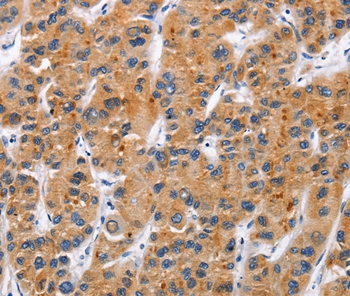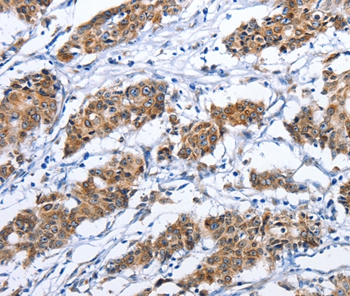

| WB | 咨询技术 | Human,Mouse,Rat |
| IF | 咨询技术 | Human,Mouse,Rat |
| IHC | 1/50-1/200 | Human,Mouse,Rat |
| ICC | 技术咨询 | Human,Mouse,Rat |
| FCM | 咨询技术 | Human,Mouse,Rat |
| Elisa | 咨询技术 | Human,Mouse,Rat |
| Aliases | ILA; 4-1BB; CD137; CDw137 |
| Entrez GeneID | 3604; |
| Host/Isotype | Rabbit IgG |
| Antibody Type | Primary antibody |
| Storage | Store at 4°C short term. Aliquot and store at -20°C long term. Avoid freeze/thaw cycles. |
| Species Reactivity | Human |
| Immunogen | Fusion protein corresponding to a region derived from internal residues of human tumor necrosis factor receptor superfamily, member 9 |
| Formulation | Purified antibody in PBS with 0.05% sodium azide. |
+ +
以下是关于TNFRSF9抗体的3篇代表性文献及其摘要内容:
1. **文献名称**: "Anti-CD137 monoclonal antibody administration augments the antitumor efficacy of dendritic cell-based vaccines"
**作者**: Melero, I. et al.
**摘要**: 该研究证明,抗CD137(TNFRSF9)抗体可通过增强T细胞活化和细胞毒性,显著提高树突状细胞疫苗的抗肿瘤效果,尤其在黑色素瘤和结肠癌小鼠模型中观察到肿瘤消退。
2. **文献名称**: "Combined CD137 (4-1BB) and CTLA-4 blockade for the treatment of advanced melanoma"
**作者**: Vinay, D.S. et al.
**摘要**: 研究发现,联合使用抗CD137抗体和抗CTLA-4抗体可协同激活T细胞,克服肿瘤微环境中的免疫抑制,在晚期黑色素瘤模型中显著延长生存期并减少肿瘤负荷。
3. **文献名称**: "TNFRSF9 agonists and antibodies for cancer immunotherapy: current progress and future directions"
**作者**: Chester, C. et al.
**摘要**: 综述分析了TNFRSF9抗体在癌症免疫治疗中的作用机制,包括单药及联合疗法(如PD-1抑制剂)的临床前及早期临床试验数据,强调其增强抗肿瘤免疫应答的潜力及安全性挑战。
4. **文献名称**: "Phase I study of urelumab (anti-CD137) in patients with advanced solid tumors"
**作者**: Segal, N.H. et al.
**摘要**: 该一期临床试验评估了抗CD137抗体Urelumab的安全性,发现其可激活T细胞并展现部分抗肿瘤活性,但高剂量可能引发肝毒性,提示需优化剂量策略。
TNFRSF9 (tumor necrosis factor receptor superfamily member 9), also known as CD137 or 4-1BB, is a cell surface protein that belongs to the TNF receptor superfamily. It plays a critical role in co-stimulatory immune signaling, primarily expressed on activated T cells, natural killer (NK) cells, and dendritic cells. TNFRSF9 interacts with its ligand, 4-1BBL (CD137L), to enhance T cell proliferation, survival, and cytokine production, making it a key regulator of adaptive immunity and a potential therapeutic target in cancer and autoimmune diseases.
Antibodies targeting TNFRSF9 have been developed to either agonize or antagonize its signaling. Agonistic anti-TNFRSF9 antibodies (e.g., utomilumab, urelumab) are designed to amplify T cell activation, particularly in cancer immunotherapy. Preclinical studies show they can enhance anti-tumor immune responses, often in combination with checkpoint inhibitors like anti-PD-1/PD-L1 agents. However, dose-related toxicity, such as liver inflammation, has limited clinical translation. Conversely, antagonistic antibodies may suppress overactive immune responses in autoimmune conditions.
TNFRSF9 antibodies also serve as research tools to study immune cell dynamics, tumor microenvironments, and receptor-ligand interactions. Their dual role in modulating immune activation or inhibition underscores their therapeutic versatility. Ongoing research focuses on optimizing antibody design (e.g., bispecific formats, Fc engineering) to balance efficacy and safety for applications in oncology, infectious diseases, and immune regulation.
×